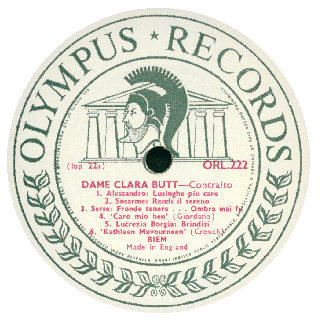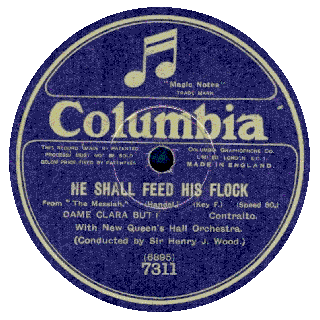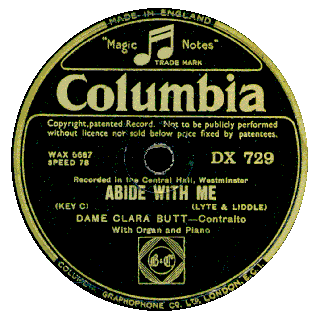

I’D BETTER COME CLEAN from the start. I’m not an opera buff; come to that, I’m not particularly into “concert platform” singers either!
So how, and more importantly, why did I develop an interest in Dame Clara Butt? Good question!
I FIRST CAME ACROSS DAME CLARA in the mid-sixties; probably first heard her on the radio. I remember being both fascinated and astounded by the power of her voice in the low registers. She was the first contralto I’d ever heard who seemed to truly justify the description.  So, I ran out to my local classical record specialist (The Classical Record Shop in Albion Street, Leeds, England – now long gone!) to see what was available.
So, I ran out to my local classical record specialist (The Classical Record Shop in Albion Street, Leeds, England – now long gone!) to see what was available.
I came home with the only LP around at the time; “Dame Clara Butt” on the Olympus label (ORL222).
The more I heard, the more fascinated I became. Here was unashamed sentimentality that you never heard in the nineteen-sixties, and the evocations of Empire were deliciously embarrassing. Even Ronald Phillips put it in his sleeve note; “‘Land Of Hope And Glory’ does not today have the same emotional command on everyone; it has therefore been placed at the end of the recital, to be played or not, at the will of the collector”.
I have to tell you, this collector played it!
I also played Clara to several friends who were into both Bob Dylan and Louis Armstrong. They didn’t seem to like her at all; said she had a weird voice. So I put on ‘Like A Rolling Stone’ and ‘What A Wonderful World’ and they seemed happier. Anything for a quiet life…
I TOOK MYSELF OFF to Leeds’ Merrion Centre Indoor Market to nose around stalls that specialised in old 78s. One stallholder asked what I was looking for.
“‘He Shall Feed His Flock’ by Dame Clara Butt,” I replied.
“Ho, yus,” quoth the charlatan, “‘He Shall Lead(!) His Flock’ by Claim Dara(??). One of my favourites!”
I eventually ran this copy to ground in Wakefield.
BUT NONE OF THIS answers the question of why I got into Clara Butt. On reflection, I can tell you in one word: sincerity.
Y’see, when you listen to CB recordings (particularly the early ones from 1909 to 1914), you’re on a direct line to a world long gone; “The British Empire Upon Which The Sun Never Set”.
Clara WAS the music of Empire. Six feet two inches tall with a booming voice that filled the Royal Albert Hall, Clara thundered ‘Abide With Me’ and ‘The Holy City’ and, yes, ‘Land Of Hope And Glory’ with a confidence and conviction that exemplified the era. She was unmatched by any of her contemporaries.
Of course, she was also a creation of her time. No-one in those far-off days before the First World War believed that Empire would ever end; and the music reflected that.
These were not days of innocence – far from it! But it’s a fact that most of the great engines of change in the 20th Century had yet to occur. The Great War, the rise and fall of Communism, the great depression, Hitler and the Second World War - not to mention radio, television and the IT revolution - were still far away over that never-ending Imperial horizon.
And so Clara took her songs across Europe, and to the USA, Canada, Australia, New Zealand, India and Japan; several  times over! This was the woman who, dressed as Britannia, could still be heard above chorus and orchestra, outdoors, in London’s Hyde Park. And all without microphones. As Sir Thomas Beecham put it, “On a clear day, you can hear her across the English Channel!”
times over! This was the woman who, dressed as Britannia, could still be heard above chorus and orchestra, outdoors, in London’s Hyde Park. And all without microphones. As Sir Thomas Beecham put it, “On a clear day, you can hear her across the English Channel!”
The real sadness is that, so far as posterity is concerned, Clara Butt “hitched her cart to the wrong horse”. Empire did end. And whereas great singers like Adelina Patti and Dame Nellie Melba are revered even today, Clara is largely forgotten. But not completely.
CDs ARE BEING RELEASED, books are being written, and slowly but surely the qualities of this great lady are again being recognised.
A very fine essay on the life of Clara Butt is included with Michael Aspinall’s sleeve note to the “Clara Butt: A Critical Survey Vol. 1 – The Acoustic Years” CD (Marston 52029-2). Click here to read the on-line version. If you can find it, Ivor Newton’s “At The Piano” (Hamish Hamilton 1966) features a useful chapter on his time with CB under the heading “Britannia In Song”. And Winifred Ponder wrote an iffy biography, “Clara Butt, Her Life Story” (Harrap & Co 1928). This can still be found in some second-hand bookshops.
As well as all the above, my researches for the Released and Unreleased Discographies have encompassed my own collection, the excellent on-line catalogue at The
ALMOST SEVEN DECADES after her death, Dame Clara Butt’s presence is being felt yet again; and there's more to that presence than the existing CDs, magazine articles or, dare I say it, this website. The Released Recordings discography lists many original 78s that have yet to re-surface, whilst the Unreleased Recordings hint at unheard gems which may still be languishing in the vaults. If they are, they're just waiting for some digital wizard to clean them up and set them free.
We can’t even guess what Dame Clara herself would think of this renewed interest in her work. All we do know is that we haven’t come to the end of her story. Not yet; not by a long chalk. More is to come…
TM.
 British Library's National Sound Archive, the US Library Of Congress archive, and the invaluable work of Dennis Foreman, published in the June 1999 issue of The Record Collector. Click here to visit that magazine’s website.
British Library's National Sound Archive, the US Library Of Congress archive, and the invaluable work of Dennis Foreman, published in the June 1999 issue of The Record Collector. Click here to visit that magazine’s website.